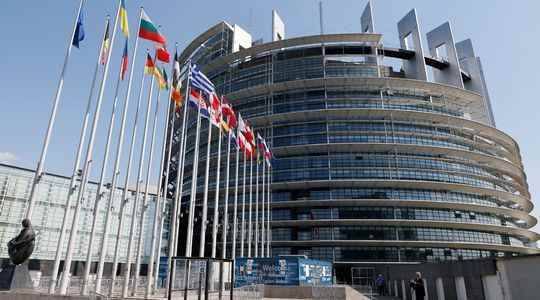The ecological transition is on the menu of debates in the European Parliament this Tuesday, June 7. Eight legislative proposals are examined by the deputies of the 27 member countries in Strasbourg to be recorded by the vote of the deputies the next day.
These measures are part of the “climate package” or “Fit for 55”a European roadmap aiming to reduce the EU’s greenhouse gas emissions by at least 55% by 2030 compared to 1990 and to achieve net zero greenhouse gas emissions (neutrality climate) by 2050. Among the reforms on the table, some are already criticized by part of the European opposition, this is the case of the proposal to end the sale of new gasoline or diesel internal combustion vehicles in Europe from 2035.
- Towards the end of new thermal cars in Europe
Brussels announced last year its objective of reducing CO2 emissions from new cars in the European Union to zero from 2035, which will prevent the sale of petrol and diesel vehicles by this date in favor of 100 engines. % electric. “This is an essential condition for making low-emission vehicles accessible to households and accelerating the transition of the automotive sector while saving many jobs in the sector”, explains the Climate Action Network on its website.
But European manufacturers have repeatedly warned about the social impact of the green transition, fearing that it will lead to the closure of factories and the destruction of jobs. The European commissioner, Thierry Breton, then insists that the manufacturers “do not forget that their vocation is to serve the world market and to take care of the entire industrial ecosystem”. He added that he wanted “the large groups to fully understand their responsibilities and that they continue to manufacture heat engines in Europe for the rest of the world, rather than suddenly relocating for reasons that would not be understandable”.
For her part, the presidential finalist Marine Le Pen believes that the European Union risks “transforming cars into luxury goods” and penalizing the middle class.
- The system of pollution permits called into question
Today there is a system of pollution permits for companies which are encouraged to emit less CO2. This emissions trading system obliges more than 10,000 power plants and industries to have a permit for each tonne of CO2 emitted. “The less they pollute, the less they pay”, summarizes the european parliament website. There are also free quotas for the steel, cement, fertilizer, aviation and maritime sectors. “An aberration when emissions from the industrial sector have not fallen for more than 10 years”, comments Climate Action Network.
The stated ambition today is therefore to further reduce the number of annual allowances available until 2030, and to eliminate free allowances on the same date. In return, the European Parliament intends to adopt a carbon tax at Europe’s borders imposed on “goods imported from less ambitious countries”, specifies the Parliament, which “would prevent companies from transferring their production to a country whose rules on greenhouse gas emissions are less stringent”.
- A social fund for the climate
According to the EU, this is a fund that “will benefit households, micro-enterprises and transport users who are vulnerable and particularly affected by the repercussions of the transition to climate neutrality”. This social fund for the climate, which must also be addressed during these debate sessions in the European Parliament, provides for temporary measures of direct income support for the most modest households and dependent on non-clean energies: a reduction in taxes and energy charges. Support that will be phased out by 2032.
This aid is also intended to cover investments in the renovation of buildings and in renewable energies. In the form of vouchers, subsidies or zero-interest loans, it would also encourage people to favor public rather than private transport, such as carpooling, car sharing or even the use of clean transport such as cycling.
- National goals for 2030
To achieve its objectives of reducing by at least 55% by 2030, the European Union must finally distribute the effort between member countries with annual constraints to be respected in terms of greenhouse gas emissions. If the annual reduction target is now 29% by 2030, the parliament intends to increase it to 40%, as proposed by the parliament’s environment committee.
This objective is calculated according to the situation of each country, taking into account GDP per capita. To ensure that the commitment is implemented, the parliament plans to draw up an emissions reduction strategy. Thus, the objective to be achieved by 2030 goes for Luxembourg from -40% to -50%, for Germany it goes from -38% to -50%, and for France, from -37% to – 47.5%.
All these measures must still be definitively voted by parliament on Wednesday, and associations in favor of the fight against climate change fear a strong influence from lobbies. “If we add up all the lobbies, in the end, we no longer have any climate action and it’s irresponsible when we know the consequences of climate change”, thus warned MEP Pascal Canfin on franceinfo. “The Climate Action Network asks the European Parliament not to give in to lobbies and to take the turn of the ecological transition and its benefits by voting for ambitious reforms for the climate”, calls for its part the association committed against climate change. climatic.
